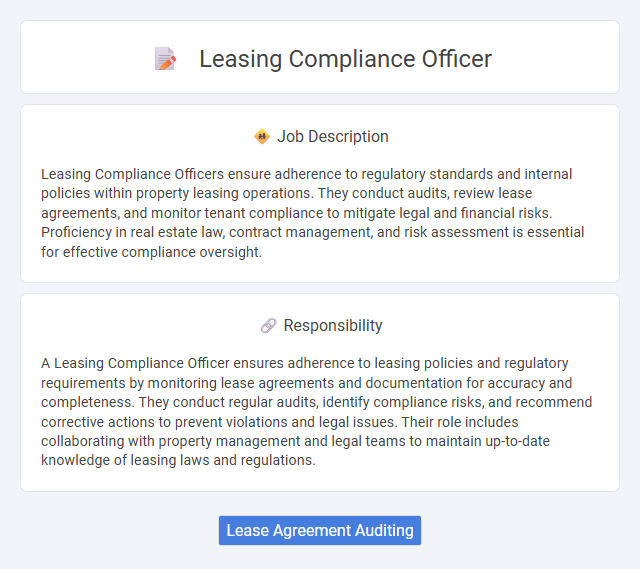
Leasing Compliance Officers ensure adherence to regulatory standards and internal policies within property leasing operations. They conduct audits, review lease agreements, and monitor tenant compliance to mitigate legal and financial risks. Proficiency in real estate law, contract management, and risk assessment is essential for effective compliance oversight.
Individuals who possess strong attention to detail, excellent organizational skills, and a solid understanding of leasing regulations are likely to thrive as Leasing Compliance Officers. Candidates with a background in law, real estate, or property management may find the role particularly suitable due to the need for interpreting complex lease agreements and ensuring adherence to legal standards. Those who excel in communication and problem-solving may have a higher probability of success in managing compliance risks and fostering positive landlord-tenant relations.
Qualification
A Leasing Compliance Officer must have a strong understanding of federal, state, and local housing laws, including fair housing regulations and lease agreements. Candidates typically require a bachelor's degree in real estate, business administration, or a related field, combined with experience in property management or legal compliance. Proficiency in conducting audits, preparing detailed reports, and implementing compliance training programs is essential for success in this role.
Responsibility
A Leasing Compliance Officer ensures adherence to leasing policies and regulatory requirements by monitoring lease agreements and documentation for accuracy and completeness. They conduct regular audits, identify compliance risks, and recommend corrective actions to prevent violations and legal issues. Their role includes collaborating with property management and legal teams to maintain up-to-date knowledge of leasing laws and regulations.
Benefit
Leasing Compliance Officers likely ensure that property leasing agreements adhere to legal regulations, minimizing the risk of costly violations. Their role probably enhances tenant satisfaction and retention by maintaining transparent and fair leasing practices. Compliance efforts may also protect the organization from financial penalties and reputational damage, offering substantial long-term benefits.
Challenge
A Leasing Compliance Officer likely faces challenges in navigating complex regulatory environments while ensuring all leasing agreements meet legal standards. The probability of encountering ambiguous contract terms requires meticulous attention to detail and continuous collaboration with legal teams. Managing risk and maintaining up-to-date knowledge of compliance policies probably demands strong analytical skills and adaptability.
Career Advancement
Leasing Compliance Officers play a crucial role in ensuring that property leases adhere to legal standards and company policies, providing a strong foundation for career growth in real estate management and regulatory affairs. Mastery of lease compliance regulations and risk management strategies opens pathways to senior compliance roles, property management executive positions, and legal advisory careers within real estate firms. Continuous professional development and certification in property law and compliance analytics significantly enhance advancement opportunities and earning potential in this field.
Key Terms
Lease Agreement Auditing
A Leasing Compliance Officer specializes in lease agreement auditing to ensure all lease contracts comply with legal, financial, and regulatory standards. They meticulously review lease terms, identify discrepancies, and enforce adherence to internal policies and external regulations, reducing risk and preventing potential legal disputes. Expertise in lease documentation, industry regulations, and audit procedures is critical for maintaining transparent and compliant leasing operations.
 kuljobs.com
kuljobs.com